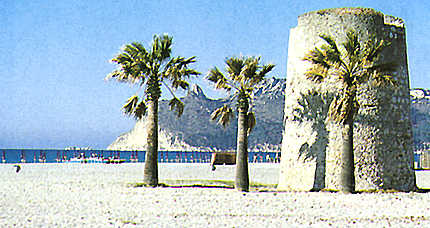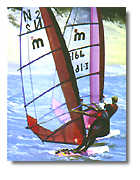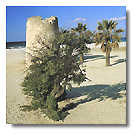
Giaime Pintor, in the 30s, use to call the sand of the Poetto beach "almost African".
Poetto is the closest and most popular beach to Cagliari. This beach is nowadays
separated from the ever expanding city by a small stretch of undeveloped land.
The name of this long sandy shore, from "Sella del Diavolo" ("The Saddle of the Devil")
to "Margine Rosso" (The Red Boarder) in Quartu. The name "Poetto" probably derives
from the tower called "del poeta" ("of the poet") which stands on the Eastern side
of the S. Elia promontory.
The first lidos on Poetto beach were "Lido" and "D'Aquila" which were opened in the
early 1900s. The bathers became more and more numerous because of the beautiful brilliant
white sand dunes, the transparency of the water which extends to the horizon. Small wooden huts in the same style as the first beach huts in Lido were built along the
beach. These multicolored constructions became something between changing rooms and
small seaside houses.
Poetto became not only a swimmers paradise but also an open air recreation area.
Nowadays Poetto beach looks very different from before. The popularity of Poetto has
led to the establishment of services and amenities that one can find on every crowded
beach: such as pedal powered boats, refreshment stands, pizzerias and an amusement
park. The things that made Poetto unique like the open air theatre in Lido during the
20s and 30s years and the multicolored wooden huts have gone. The wooden huts were
demolished in 1986 as they were considered unhygienic. Unfortunately the decision
makers did not take into consideration the architectural and cultural heritage they represented.
Poetto remains a pleasant beach because it is not far from the city, because of its
large sandy shore and its clean sea water.
Certainly if one wishes to admire the enchanting "Torre del Poeta" it is better to
avoid the most popular parts of the beach and the busiest periods. The conditions
change with the wind. A slight Mistral wind is enough to freshen the air, to make
the colors more vivid and the sea water more transparent.
When the Mistral blows it is possible to understand the origin of the fable which
gave "Golfo degli Angeli" and "Sella del Diavolo" their names. Golfo degli Angeli
is the gulf where Cagliari is situated and Sella del Diavolo is the hill that overlooks
Poetto from the South.
As the legend goes devils took control of the Gulf. They were defeated by the Archangel
Michel after a long hard battle. During the devils retreat their leader Lucifero,
lost his saddle which fell into the sea and became petrified. Since then the Angels
have taken care of the Gulf and have promised ever lasting peace.
|









